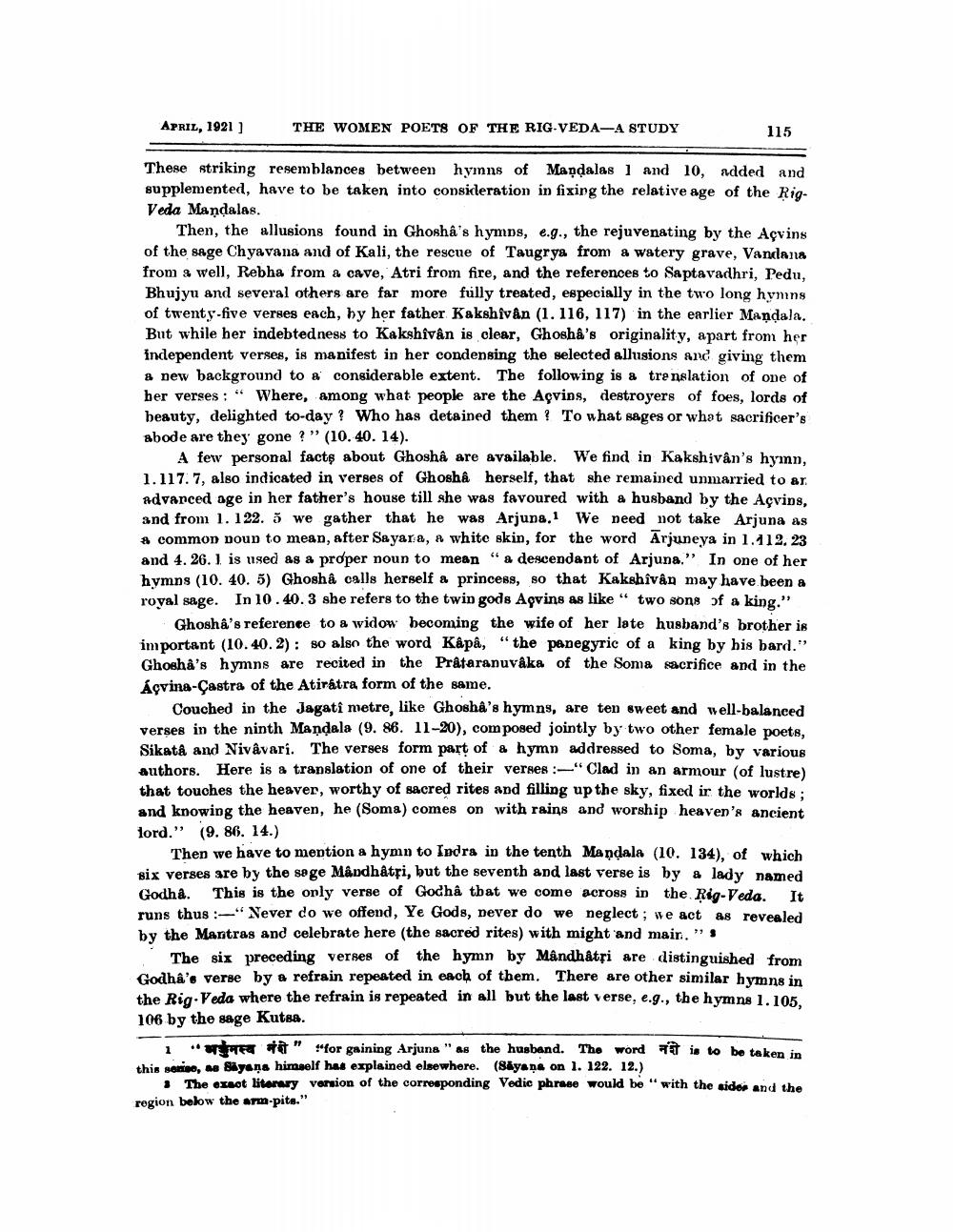________________
APRIL, 1921]
THE WOMEN POETS OF THE RIG VEDA-A STUDY
115
-
These striking resemblances between hymns of Maņdalas 1 and 10, added and supplemented, have to be taken into consideration in fixing the relative age of the Rig. Veda Mandalas.
Then, the allusions found in Ghoshâ's hymns, e.g., the rejuvenating by the Açvins of the sage Chyavana and of Kali, the rescue of Taugrys from & watery grave, Vandana from & well, Rebha from & cave, Atri from fire, and the references to Saptavadhri, Pedu, Bhujyu and several others are far more fully treated, especially in the two long hymns of twenty-five verses each, hy her father Kakshivân (1. 116, 117) in the earlier Mandala. But while her indebtedness to Kakshivån is clear, Ghoshâ's originality, apart from her independent verses, is manifest in her condensing the selected allusions and giving them a new background to a considerable extent. The following is a tre nelation of one of her verses : " Where, among what people are the Açvins, destroyers of foes, lords of beauty, delighted to-day? Who has detained them? To what sages or what sacrificer's abode are they gone?” (10.40. 14).
A few personal facts about Ghosha are available. We find in Kakshivân's hymn. 1.117.7, also indicated in verses of Ghoshê herself, that she remained unmarried to ar advanced age in her father's house till she was favoured with a husband by the Açvins, and from 1. 122. 5 we gather that he was Arjuna. We need not take Arjuna as & common poup to mean, after Sayara, a white skin, for the word Arjuneya in 1.112. 23 and 4. 26. 1 is used as a proper noun to mean "a descendant of Arjuna." In one of her hymns (10. 40. 5) Ghosha calls herself a princess, so that Kakshîvân may have been a royal sage. In 10.40.3 she refers to the twin gods Apvins as like“ two song of a king."
Ghoshâ's reference to a widow becoming the wife of her late husband's brother is important (10.40.2) : so also the word Kåpa, "the panegyric of a king by his bard." Ghoshâ's hymns are recited in the Prátaranuvâka of the Soma sacrifice and in the Ágvina-Castra of the Atirátra form of the same.
Couched in the Jagati metre, like Ghoshâ's hymns, are ten sweet and well-balanced verses in the ninth Mandala (9. 86. 11-20), composed jointly by two other female poets, SikatA and Nivâvari. The verses form part of a hymn addressed to Soma, by various authors. Here is a translation of one of their vernes :-“Clad in an armour (of lustre) that touches the heaver, worthy of sacred rites and filling up the sky, fixed ir the worlds; and knowing the heaven, he (Soma) comes on with rains and worship heaven's ancient ford." (9. 86. 14.)
Then we have to mention a hymn to Indra in the tenth Mandala (10. 134), of which six verses are by the søge Måndhátri, but the seventh and last verse is by & lady named Godha. This is the only verse of Godhà that we come across in the Rig Veda. It runs thus :-"Never do we offend, Ye Gods, dever do we neglect; we act as revealed by the Mantras and celebrate here (the sacred rites) with might and main.",
The six preceding verses of the hymn by Mândhâtsi are distinguished from Godha's verse by a refrain repeated in each of them. There are other similar hymns in the Rig Veda where the refrain is repeated in all but the last verse, e.g., the hymns 1.105. 106 by the sage Kutsa.
1 RE #" "for gaining Arjuna " as the husband. The word is to be taken in this senino, me Süyana himself has explained elsewhere. (Sayana on 1. 122. 12.)
1 The exact literary version of the corresponding Vedic phrase would be with the sider and the region below the arm-pita."




